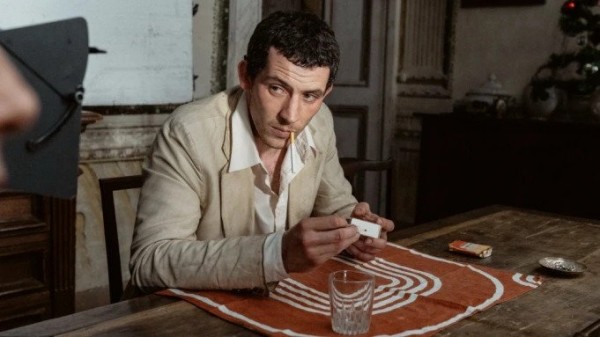-
THE SETTLERS/LOS COLONOS (Felipe Galvez 2023)
FELIPE GALVEZ: THE SETTLERS/LOS COLONOS (2023)

Massacre of indigenous tribes at the hands of Spanish landowners in in 1901
The vast area of Tierra del Fuego is owned by wealthy rancher José Menendez (the great, and busy, Alfredo Castro). Under Menendez's authority three men – Scottish army captain MacLennan (Mark Stanley), American mercenary Bill (Benjamin Westfall) and young mestizo tracker Segundo (Camilo Arancibia) ride out through the land with the zsskin a safe route to the coast. Given free rein, the men embark on a wild killer rampage, persecuting and slaughtering the indigenous Selk’nam people.
Galvez' Cannes prizewinner may fall short as narrative, where it is fragmentary, but it is stunning filmmaking, using square format and closeups and percussive sound to shock us with the ugly violence of early white invasion of Chile and neighboring regions. Wendy Ide calls this film "savage if tonally uneven" in her Screen Daily review; but that is the point: the total disconnect between one minute and the next, in depicting a world in which morality and logic are missing; where there are no rules so atrocities prevail, and they're only a faint memory back in the capital.
This film relates to Lucrecia Martel’s Zama (2017) and Lisandro Alonso’s Jauja (2014), audacious and influential recent depicting the brutality of colonialism in an offbeat way.
The Settlers/Los colonos. 97 mins., debuted in Certain Regard at Cannes, receiving the FIPRESCI Prize, the first Chilean production to do so. Screened for this review as part of the New York Film Festival. OCT. 2 & 4, Q&As with Galvez.
Limited US release in Jan. 2024 has been announced by Cinema Tropical.
Last edited by Chris Knipp; 01-03-2024 at 03:18 PM.
-
MAY DECEMBER (Todd Haynes 2023)
TODD HAYNES: MAY DECEMBER (2023)

NATALIE PORTMAN, JULIANNE MOORE IN MAY DECEMBER
Seamy, steamy, funny scandal-dredging
Haynes' layered drama, which has been called his warmest and most accessible, consciously has things in common with Ingmar Bergman's Persona, where a nurse (Bibi Anderson) and her mute famous actress patient (Liv Ullman) find themselves converging. We've got two similarly famous actresses mirror-converged here, sometimes consciously posed on-screen à la Bergman: they are Julienne Moore and Natalie Portman, who are seen sharing makeup methods, mirrors, and stares into each other's eyes. This movie offers Oscar prospects for both Moore and Portman, because both get a chance to chew up a lot of scenery and both have juicy, borderline lurid roles. The film seems rather a mixed bag, very watchable certainly, but so complex and multi-directional it leaves little clear impression, better perhaps in post-watching analysis than in the viewing - though such analysis may reveal lacunae or anomalies.
The creepy-weirdo element here not found in Persona (apart from Bergman's usual highly wrought emotional intensity) is the central tabloid source, May December being loosely based on the story of Mary Kay Letourneau, the Seattle teacher who went to jail for having sex with a 12-year-old boy and subsequently had two daughters by him and married him.
In Todd Haynes' film, actress Elizabeth Berry (Portman), known for a popular TV series called "Norah’s Ark," is going to be in a film about a woman made famous by tabloid romance, played by Moore; and comes to stay with Gracie Atherton-Yoo (Moore) and her family; Gracie hopes this new film will tell her story better than a crude version published back in the day. (The movie doesn't reveal the background story all at once, letting it out bit by bit.) The seventh-grader Gracie had sex with at 14 and later married (as we eventually learn) is now 33 and known as Joe (Charles Melton). Their various children (it's hard keeping track of them) are grown, but around. Elizabeth bakes cakes. What does Joe do? Much of the attention is on Portman's character, though Gracie may seem to be just as much a star, of the tabloid kind. It is hard not to think frequently of both women in the film primarily just as actresses. (But that's fun, to be sure.) There is something very campy about this glossy cinematic bringing together of two prima donnas. This is another of Haynes' gay films, one of the gayest.
Hayes goes for a hothouse atmosphere ripe for love from the start with lots of hazy cinematography, implying actual heat, sometimes perhaps merely air pollution, with the action set in Savannah, Georgia in a big house that makes you think of a cotton plantation. Where the Atherton-Yoo family would get the dough for their comfortable lifestyle is unclear. Maybe there is family money somewhere; maybe the tabloid scandal proved lucrative.
There is a musical theme, and it's a powerful reworking of Michel Legrand's score for The Go-Between. Joe raises Monarch butterflies, and early images are of fuzzy germination and flight. (The film was originally to be set in Camden, Maine; the switch must have changed the tone. The original cinematographer was to be Edward Lachman, changed to Christopher Blauvelt due to a Lachman health problem, and this must have changed things too.)
The scene is set well. The action is a mixture of elements that perhaps intentionally clash. Gracie seems hysterical, and may not have much of a life. She has a prolonged crying jag, comforted by Joe, when one of her pastry clients cancels her business. There are Gracie's kids by Joe, and older ones by her first husband. Joe, a handsome hunk with impressive cheekbones and bee-sting lips and an ethnic look (Melton, a former model and "Riverdale" actor, is part Caucasian American, part Korean, part Cherokee). He simply is, also is interviewed by Elizabeth, comforts Gracie, and flirts with someone in daily text message exchanges. In one memorable scene he's out on a roof and seems for a moment likely to fall off.
The presence of Elizabeth upsets whatever apple carts there are in this complicated hothouse. We may wonder if she herself may be a bit off to take on such a role as this. She is seen being inappropriately detailed in talking about how to do sex scenes to a junior high acting class. Checking out online candidates to play the boy her character will seduce or be seduced by - in a late exchange Gracie reminds Joe "You seduced me - Elizabeth says the boy actors aren't "sexy enough." She flirts more and more with Joe.
We don't always know how we are to take matters or how they are being taken; not always exactly sure where the funny melds into the icky, or when the fraught fades into the mundane. Haynes and his writer Samy Burch choose not to have a single overt interpretation or moral position on central events of this story. Some of us might prefer a film that did have that, but the fascination, even if the matter gets blurred, is that this way they keep it complicated, so one doesn't know where things are going from one scene to the next. The many layered, however, may get confused with the blurry, as signalled by the opening shots.
May December , 113 mins., debuted at Cannes May 2023. It is included in dozens of other festivals, including the NYFF, where it was the Opening Night film Sept. 29. Opening theatrically in the US Nov. 17, 2023. Metacritic rating: 8̶3̶%̶ 85% (upgraded DEc. 2023).
Last edited by Chris Knipp; 12-20-2023 at 12:30 AM.
-
POOR THINGS (Yorgos Lanthimos 2023)
YORGOS LANTHIMOS: POOR THINGS (2023)

EMMA STONE AND MARK RUFFALO IN POOR THINGS
Bawdy, supremely visual period genre exploration of human possibility, and triumph for Emma Stone
Lanthimos' latest film, the big winner at the Venice Film Festival, is a sort of bonkers reworking of the Frankenstein myth with a female re-creation. This is even more of a critical success than its predecessor, The Favourite, maybe not more of a popular success. It's more offensive to common taste and values than the latter. But it demands attention and delights the eye with its beautiful and distinctive mise-en-scène and use of locations, and it lives and breathes though an adept and go-for-broke performance by Emma Stone in the lead role. It's ultimately wearying, too much of a good, or delightfully bad, thing, but it has a "look" that never falters in being impressively consistent throughout. Lanthimos has grown in skill and appeal from film to film and this is a peak, a fluent and bold tour de force that astonishes and delights as much as it offends and provides a gloriously visual realization of an interesting tale.
Everything is set in the nineteenth century when there were carriages: one of them early on is memorably drawn by a what is only the stuffed head of a horse, one of many signals that everything is a little bit off-kilter. This is a time, it is assumed, when science and medicine are at liberty to play wildly with nature. Hence a well-off woman drops off a bridge and drowns and Willem Dafoe's doctor-surgeon Dr. Godwin Baxter, with a heavily scarred face (an elaborate feat of prosthetics and makeup) and a seemingly plausible Scottish accent (perhaps an homage to the late Alastair Gray on whose book this film is based) reanimates the drowned lady's body with the help of a lot of electricity together with surgical insertion of a fresh baby's brain. Voilà! A mature woman with long raven tresses and the unformed mind and undeveloped motor skills of a child.
What follows is a sort of around the world in a crazy eighty days during which Bella Baxter, as the doctor has named his creation - and he has her call him "God" - grows with astonishing rapidity from a rude, balletic non-person who spits out food, boxes people and babies in the face, and is as dependent and worshiping toward him as an Irish setter to its master, to a lady who reads books and thinks and manipulates men as she likes.
The panache with which Emma Stone performs in this role is a delight, beginning with her inventive and original choreography of a body learning to balance and move. A lot of Lanthimos' action however, and often The writing attributed to Alasdair Gray and The Favourite coscriptor Tony McNamara, is as much gratuitously crude and silly at times as it is bold. The childish provocations sometimes distract from what might be possible insights.
And yet we should begin with the settings and look, which in turn begin with the use of a fisheye lens that rounds and expands everything, whether interior or exterior, providing a quaint, painterly, and quite beautiful look, sometimes in black and white, more often in color.
Meanwhile Bella's development is largely framed around sex. She discovers early the delights of self-pleasure, and couples with one man who uses, and then repentantly loves, her, Duncan Wedderburn (Mark Ruffalo, whose posh English accent is tongue-in-cheek), and another man, a student of the doctor, who reveres and is betrothed to her, Max McCandless (Ramy Youssef). Bella is a free woman though, and even her experiences of a Parisian brothel - elaborately realized, including a memorable interior seen from above, is an energetic, cooly intellectual exploration of possibilities, and way of making money.
Lanthimos has graduated from "dour, deadpan little tales," as Stephanie Zacharek puts it in her understandably admiring Time review, that show how wicked men can could be as if we needed to know, to things that are "more wickedly cheerful and bawdy." This may still be seen as a mixed blessing, except that he has also simply grown enormously as a filmmaker along with the opening up of mood. Poor Things is more challenging as a project and frankly magnificent - you can call it show-offy if you like - than anything he has done before. Movies are about visuals, after all; this film is very much that, and also has a plot. It could have done with less vulgarity, tempered its violence, and edited out twenty to thirty unnecessary or repetitive minutes. But one no longer cringes at the prospect but instead now anticipates with pleasure what Lanthimos will do next.
A standout of the year and Oscar-worthy in many categories, as pointed out by YouTube's "The Oscar Expert," "brother bro," and a female Lanthimos fan guest in their Oct. 18, 2023 review. It now may rank with and even exceed Oppenheimer in awards season.
Poor Things,141 mins., debuted at Venice Sept. 1, 2023, where it won the Golden Lion for best film. It was subsequently scheduled for a great many international festivals, including the NYFF, where it was screened for this review and shown Sept. 30, 2023. Metacritic rating: 9̶4̶%̶ - now 87%.

EMMA STONE IN POOR THINGS
Last edited by Chris Knipp; 02-02-2024 at 11:44 PM.
-
LA CHIMERA (Alice Rohrwacher 2023)
ALICE ROHRWACHER: LA CHIMERA (2023)

JOSH O'CONNOR IN LA CHIMERA
Etruscan treasures that tempt and cloy
Alice Rohrwacher, whose older sister Alba is a famous Italian actress, has received much favorable recognition for her earlier films, Corpo Celeste (2011), The Wonders (2014), and Happy as Lazzaro (2018), all of which were included in the New York Film Festival, like this one. Her new one, set in the Tuscan countryside in the nineteen eighties, centers on a young British archaeologist who gets involved in an international network of stolen Etruscan artifacts during the 1980s.
La Chimera was greeted at Cannes as "enchanting" (Guy
Lodge inVariety) and "uproarious" and "captivating" and as a film that "teems with life," receiving one of only two five-star ratings from Bradshaw at this year's Cannes. It's a rollicking fantasy that features Josh O'Connor as the rather disheveled English archeologist now teamed up with a Felliniesque gang of grave-robbers who falls in love with the gone daughter of Isabella Rossellini. Watch the TRAILER and see if it's your kind of thing. (Rohrwacher has evoked the colorful, populist chaos of classic Italian directors before, De Sica, Zavattini and the Taviani brothers, as well as Fellini.) She also recently directed the series of Elena Ferrante's "My Brilliant Friend" ("L'amica geniale") for Italian television, with her sister Alba as the narrator.
The fantasy of supernatural element survives here in that Arthur (O'Connor's character) uses dowsihg rods to find Etruscan tombs. He is treated by the local artifact thieves or tomb robbers as a wise man, a magical savant. On the other hand when he arrives by train, coming from jail tlme, a ride when he is "outed" as a bad man by passengers who leve him alone in a compartment b himself, sporting a rough prison haircut and a dirty (though well cut) white linen suit, he looks generally scruffy and that only grows throughout the film. He finds what may be a rundown castle, a big room presided over by Flora (Isabella Rossellini) in a wheel chair, feeling "old," (and occasionally speaking English to Arthur. There are young women including Italia (Brazilian actress Carol Duare), and an unseen presence, Beniamina, Flora's daughter and allegedly Arthur's lost love, somehow lost from the world of the living. As usual Alice's sister Alba is present as Frida.
What Rohrwacher does here is similar to her last feature: she has us pass the time with her people and join their world. It is a warm and engaging, it's Italian, friendly, intimate, aided by square format and 16mm images; but not much is happening. One persistent image is of Arthur smoking a lot of cigarettes and continually searching for an "accendino," which is Italian for lighter. O'Connor functions well in Italian, suggesting he's been here for a while, though it's pointed out that he could use Italian lessons: for instance he misstates the ending of "occhi," the word for eyes. He has picked up the accent well. We see him and the mismatched miscreants - including a bawdy transvestite gang straight out of Fellini, seen in a street parade - who serve (or use?) him, finding little Etruscan objects and selling caches of them to a wholesale buyer who will sell them to collectors.
It's only after a lot of desultory messing about that this film develops a plot. Rohrwacher is more about situation and atmosphere here. But it's at such atmosphere, at sublimely intimate chaos, that Rohrwacher excels. When something happens, it involves finding Etruscan tombs, particularly a large untapped one, another world that redefines Arthur's relation to reality or to time and space, to his function in life.
The trouble is, backgrounds are patchy. How did Arthur wind up leading this seedy existence? who was Beniamina? The director is wonderful at surface detail but leaves out connective tissue. What she is talking about here, though, is clear, and has resonance with the whole Italian dilemma: living, as Tuscans do, and Romans, and Italians all over the country, with a cultural wealth so rich you can just plunge a shovel in the ground and you find it. As the always perceptive Peter Bradshaw puts it, "It can be plundered for the present day artefacts and spirits raised from the dead, but at the cost of incurring a terrible sadness: a feeling of surrounding yourself with ghosts." Italians live off their past and are weighed down by it.
La Chimera, 130 mins., debuted at Cannes in competition. Screened for this review as part of the Main Slate of the New York Film Festival, where it shows Oct. 7 and 8, 2023 with Q&A's with Alice Rohrwacher. It will be released in the US by Neon Nov. 23, 2023. Metacritic rating: 88%.

Last edited by Chris Knipp; 09-18-2024 at 06:37 AM.
-
HIT MAN (Richard Linklater 2023)
RICHARD LINKLATER: HIT MAN (2023)

GLEN POWELL IN HIT MAN
A philosophy professor moonlights as a dummy hit man for the New Orleans cops, then it gets more complicated when he gets personally involved with one of his seedy targets.
A premise so good you have only not to get in the way of it, and Linklater mostly doesn't. This movie gives off the vibe of a neo-noir, but is too mild and has too much of a feel-good, harmless ending to live up to that. Nonetheless this is a very enjoyable, loosely-slung yet exciting confection that will be giving pleasure for a long time to come.
Hit Man is all about Glen Powell, an actor some of us were quite unaware of, and besides being one of Linklater's most accomplished and entertaining pictures in years, should make this engaging, sexy actor widely known. His sizzling costar the Puerto Rican born, Mexican raised Adria Arjona is another present but hitherto unnoticed actor, and this is essential to our feeling that we're spying on a startling situation. Powell is bland, but also big and hunky. As a sometime college lecturer plus fake hit man who assumes various disguises, he's a tabula rasa who can be made dangerous and sexy, and has a potential edge to him. In short, he's ideal for this role.
The capper is that Gary Johnson is a real guy who actually did these things. It's stated in the occasional voiceovers spoken by Johnson/Powell that the hit man is a myth, though understandably, hiring somebody to kil somebody else is a crime (though one a good lawyer can get you off of in court, apparently). So that makes it odd that according to Time, there are four new hit man movies this fall: Linklater's self-titled one and David Fincher's well received pro assassin tale The Killer, both successes at Venice, plus two others, Harmony Karine's "infrared" one Aggro Dr1ft and Michael Keaton's hitman-with-dementia movie Knox Goes Away. But then--is the hit man really a total myth? Surely in the mafia it hasn't been?
The basic element here in the New Orleans-based action has nothing to do wih the mafia. It's a guy who teaches college - here philosophy and psychology, urging his charges to see their identities as constructs capable of refashioning - who first starts moonlighting doing tech work on taping and wiring for sting operations and then is drawn in to replace the police department's fake hit man when he's suspended. The linchpin of this Hollywoodization of Gary Johnson's life is that the suspended cop returns and wants his job back, but the police keep him working on backup because he's too much of a wild card ((basically an asshole). And that of course means he's a wild card also in the romance that develops between "Ron" (Gary's fake hit man name) and Madison (Adria Arjona), the hotheaded and beautiful dame who comes to him to get her repressive, horrible husband killed. She is lovely and nice, and the version of "Ron" Gary has adopted for her is simply a sexier version of his real self (he uses various disguises to suit the hit applicants). He talks her into using her hit money simply to walk away from her abusive hubby and live a new life.
She does that. But of course the abusive hubby won't just go away.
This violation of protocol on "Ron"/Gary's part signals the mutual attraction of Ron and Madison, which bears the fruit of a hot affair that geets going once "Ron" checks back to see how Madison is doing. Then there's excitement of things threatening to get messy. Gary's police department handlers aren't happy with his violation of the rules of entrapment. (By the way, despite the philosophizing about identity, which relates to Gary-Ron's use of disguises and double life, this movie never considers the ethics of luring people into committing to a crime in order to arrest them - sting operations.)
What's good, and noirish of a sort, is that there is plenty of plot here, and with that, plenty of good dialogue. There is lots of talk (including the voiceover) and very little violence, only the threat of the latter, and none onscreen. Linklater and Powell, who previously worked with him on Everybody Wants Some!! and [I]Apollo 10 1/2[/I, cowrote the script based on an article of the same name about Gary Johnson by Skip Hollandsworth in Texas Monthly. The spirits of Quentin Tarantino and the early John Dahl hover around this tasty confection.
Hit Man, 113 mins., debuted at Venice Sept. 5, 2023, also sowing at Toronto, New York, and BFI London. Screened at this review as part of the NYFF where it shows Oct. 3 and 4. Coming on Netflix, to whom it reportedly sold at Toronto for $20 million. Metacritic rating: 83%. (Later 82%.)
Last edited by Chris Knipp; 09-18-2024 at 06:39 AM.
-
MUSIC (Angela Schanelec 2023
ANGELA SCHANELEC: MUSIC (2023)

The baffling art film drama of this Sophocles-based contemporary German Berlinale Silver Bear winner starts with a romance between a prisoner and a prison guard
Jessica Kiang (Variety) calls this, Schanelec's tenth film (but the first one I've seen), a "riff" on Oedipus Rex that's "rewarding" but "radically mystifying." (She is, ultimately, very appreciative.)
But Shanelec rings changes on Sophocles, not least of which is that the Oedipus character avoids lasting repercussions from his grievous mistake, committed due to being abandoned as a baby and never knowing his origin, or his connection to the prison guard he falls in love with after being jailed for manslaughter.
She (Shanelec) is an "uncompromising formalist" whose work is another "beautiful and strange deep-niche arthouse artifact," Kiang writes. You have to know Shanelec is interpreting Sophocles going into this film to make sense of it, Kiang says, and makes clear that while Shanelec is caviar to the general, she has an enthusiastic cult following.
Jordan Mintzer (Hollywood Reporter) wrote about Music, reviewing the director's career. "While [I]Home[/I" (her previous feature)]"walked away with Berlin’s Silver Bear award in 2019," Mintzer said, "it’s hard to see Music doing the same, even if it will probably appeal to Schanelec’s admirers." He turned out to be partly mistaken: Music did win a Silver Bear, for its screenplay.
Peter Bradshaw of the Guardian also wrote about Music at the Berlinale. But while he describes its accomplishment as cinema favorably, and watched it to the end, he admits that Schanelec's refusal to render up meanings has defeated him in the past, and did so again this time.
Music can be seen as a palate-cleanser, or a challenge for cinematic puzzler-solvers. Readers are advised to consult these three cited reviews for more detailed descriptions of the film, which takes place mostly in Greece, starring French actors speaking fluent Greek. There are many long, still shots; much action takes place around the sea. The mentioned prison meeting recognizably occurs, and a car accident in which someone is killed. The leaps forward in time the reviewers describe can be observed. This is a world of sunshine, not darkness. Most shots are silent, many scenes with people lacking dialogue, but there are moments of uplifting baroque music and also live musical performances taht are very pleasant, including a short concert at the end. There is assurance in the images and editing, though it's hard to conceive of this as telling a story without consulting a shot-by-shot explanatory program as one watches. She knows what she is doing; we may not. It's a rather soothing, but baffling, watch. Music is an art film for its own self-defined audience of conoscenti.
Music, 108 mins., debuted in competition at the Berlinale Feb. 21, 2023, winning the Silver Bear for best screenplay. Also shown at Hong Kong and Istanbul. Screened for this review as part of the NYFF. Oct. 4 and 5, Q&A's with Shanelec. Metacritic rating: 72%.
Last edited by Chris Knipp; 10-03-2023 at 09:33 AM.
-
MAESTRO (Bradley Cooper 2023)
BRADLEY COOPER: MAESTRO (2023)

CAREY MULLIGAN AND BRADLEY COOPER in MAESTRO
The greatness, gay dalliances, and loving but fraught marriage of Leonard Bernstein in Cooper's classy followup to 'A Star Is Born'
Bradley Cooper's Maestro is a glitteringly elegant, precise portrait of the multitalented director, composer, and educator, with world-class, Oscar-worthy prosthetics and makeup. If there's hubris in the actor's directing himself as such a great American cultural figure, he nonetheless carries it off with panache.But in a sense the movie's not about him. It's about Felicia Montaleagre, Bernstein's elegant Chilean actress wife, and Carey Mulligan's brilliant performance in the role, elegant, tasteful, never mannered as she sometimes has been. This is a film with the limitations of its biopic elements, but it transcends that genre, and is very fine work, justifying the promise of Cooper's A Star Is Born remake directorial debut, justifying his alleged anointment by Marty or Spielberg to take on this project, for which they've given their producer blessing, their judgement proven right here.
This is the portrait of a marriage, a marriage at the heart of American and New York culture (if they can be said to coincide) lasting from 1951 to Felicia's early death of cancer in 1978. The burden of this marriage is obvious. It is not only a fame and performing life for Lennie that overshadowed Felicia's being and accomplishments, but his dalliances with men. The film achieves a weariness and excitement that linger in the mind (perhaps also in the heart). There is glorious energy, thrusting, confident mise-en-scène to match the bold simulacrum of makeup and voice and the recreation of boisterous joie-de-vivre of Leonard Bernstein that Cooper achieves.
Sometimes it feels like the picture is shying away from the main burden of its subject that clouded the marriage, as timid and closeted about gayness as the forties and fifties when the story begins. Yet this is not fair or true, because the complexity is there, and one winds up making excuses and learning to understand the repressiveness of a period and why this film is true to it. Owen Gleiberman's admiring Variety review is a good post-viewing place to begin in understanding Maestro. Gleiberman provides both a thorough description and a magnificent apology. He makes us understand how well all the things Leonard Bernstein, as "the first American conductor on a level with European legends like Arturo Toscanini," operated on so many levels, and his wild exuberance - expressed by the natural glow and sparkle of Bradley Cooper's eyes, no prosthetics needed for that - was part of a breaking of barriers that took him, with his oversize personality, beyond great musical gifts to superstardom. The film is too sophisticated to bother showing it, but Lennie became as much a household word as Albert Einstein. If Maestro works as it's well-programmed to do, it will provide hints to virgin youthful viewers of why this man remains an icon.
The movie begins in color, then goes to black and white (such binary visuals being the useful cliché of our moment now), also framing in intimate square ratio. The opening is a melancholy strain on solo piano, Bernstein's own composition like most of the film, heard before we see Lennie as a low-lit figure bent over the keyboard, it's after Felicia's death, it's a filmed interview, and he's saying how much he misses her, and his head bows down in silence after the playing. It's a great, unexpected way to begin . It declares this is not a biopic but the portrait of a marriage. But next we go to a virtuoso black and white sequence when Lennie, who hasn't met Felicia, is in his bedroom with his dreamboat lover David (Matthew Bomer), and runs through the apartment and right into Carnegie Hall. Age 25, he has gotten the big break, called in as an assistant conductor to replace maestro Bruno Walter who's taken sick, and he makes a brilliant debut, with no practice, and gets immediate recognition.
From this we go not to "West Side Story," but "a backstage riff on 'Fancy Free,' the 1944 ballet created by Bernstein and Jerome Robbins." Gleiberman points out how Cooper's screenplay written with Josh Singer (who seems to have cut his teeth on "The West Wing") continually avoids the obvious bio beats while still painting a rich, complete portrait, hardly even showing Lennie conducting until a grand, full-bore scene of Mahler in a cathedral after Felicia is dead showing how absolutely go-for-broke and magnificent Bernstein still was in his late years, the big mane of hair still shaking turned to gray, one hand still perpetually holding a lit cigarette, even when conducing a rehearsal. (This is painful to watch, but true.)
My enthusiasm is influenced by lifelong admiration of the man, not so much as a great conductor, though technically he was one, departing from the stick-figure metronome and showing how leading a symphony orchestra could be balletic and inventive, but as a great musical personality, communicating his enthusiasm and making things like his difference with Glenn Gould over the tempo of a Brahms concerto a matter of humorous but insistent controversy. The man was a force of nature, and made for great television. He communicated to all ages and persuasions. He was a public art intellectual, if there can be such a thing, in contrast to the testy political kind.
It was also an influence to see this film in what may have been the most eagerly and fully attended press screening of the New York Film Festival so far, with the audience, for a change, as pin-drop silent as attendees of a Paris cinema or theater would be. This is not a gushy crowd; it provides no ovations. But attention was paid. And this benefitted the tense moments like the big Thanksgiving argument, when Lennie has gotten sloppy, cruising his next young man openly at a party, and Snoopy both inside and outside in the parade signal the outsize egos and tragicomic mess this fraught marriage - not just of convenience, but of persistent love - has become. This, and so much more, are contained in this artful and sophisticated film.
One of the year's best American movies and a must-see.
Maestro, 129 mins., debuted at Venice, also showing at New York, Zurich, also at the New York Film Festival where it was screened for this review. Shown in the NYFF Oct. 2, 13, shown at both Walter Reade Theater and in the David Geffen concert hall, current home of the New York Philharmonic of which Bernstein was the director from 1958 to 1969. It was produced by Martin Scorsese, Steven Spielberg, and Cooper, among others, it is destined for multi-nation internet release by Netflix (Dec. 20). Metacritic rating: 80%.
(See Bernstein himself in a late interview here.)
And here is a collection of a wealth of audio-visual material entitled "Leonard Bernstein's New York, New York."
Last edited by Chris Knipp; 01-13-2024 at 04:37 PM.
 Posting Permissions
Posting Permissions
- You may not post new threads
- You may not post replies
- You may not post attachments
- You may not edit your posts
-
Forum Rules





 Reply With Quote
Reply With Quote








Bookmarks